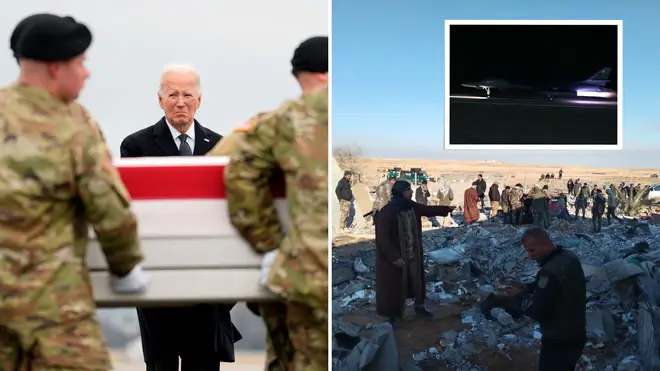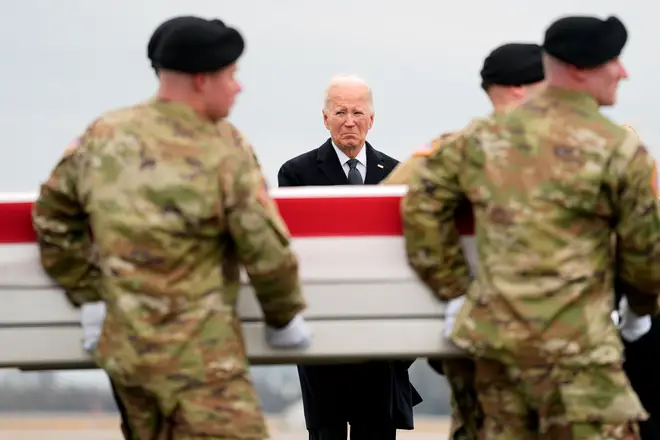
Ali Miraj 12pm - 3pm
3 February 2024, 13:44 | Updated: 3 February 2024, 14:18

Iraq has warned the Middle East is on the "brink of the abyss" after America battered almost 100 targets in revenge strikes against Iranian proxies.
US president Joe Biden ordered a retaliation after three American soldiers were killed at a base in Jordan when proxies aligned with Tehran launched a drone attack.
Warplanes struck 85 targets in Iraq and Syria, including those used by Iran's Revolutionary Guards' clandestine Quds Force, late on Friday. They hit command and control centres, intelligence facilities and weapons storage buildings.
Officials in Iraq have said 16 people were killed, including civilians, and 25 more were injured.
They said: "This aggressive strike will put security in Iraq and the region on the brink of the abyss, and it also contradicts efforts to establish the required stability.

"Iraq reiterates its refusal to let its lands be an arena for settling scores, and all parties must realise this.
"Our country's land and sovereignty are not the appropriate place to send messages and show force between opponents.
"The Iraqi government will make every effort required by moral, national, and constitutional responsibility to protect our land, our cities, and the lives of our children in all types of armed forces."
The bombing was heavily telegraphed and there were suggestions that going days without a response would allow Iran and the militias to get their personnel to safety.
But Mr Biden appears to have been determined to retaliate while avoiding a major conflict breaking out at a time of heightened global tensions amid the Russian invasion of Ukraine and Israel's siege of Gaza.
Iraq is rife with militants belonging to the Islamic Resistance in Iraq, a network of groups aligned with Iran.
Their presence is part of the very complicated political arrangement in a heavily divided, sectarian country.
Iran ultimately wants to win influence over much of the Middle East, and is influential in Iraq, Syria and the Hezbollah group in Lebanon, as well as Hamas in Gaza.

The US continues to keep a presence after toppling Saddam Hussein and then leading the anti-Isis operation.
But it has repeatedly come under attack from Iran's proxies, especially since Israel responded to Hamas's October 7 massacre.
The risk of a wider conflict with Iran in the Middle East was already higher after the US and UK bombed Houthi targets in Yemen.
The rebel group is backed by Iran, too. They have been attacking international shipping in the Red Sea and Gulf of Aden and claimed that is a response to Israel's assault on Gaza.
Critics of Mr Biden have attacked him for the response, which some hawks hoped would be tougher on Tehran.
Some wondered before the strikes whether the US would hit Iranian targets more directly, such as a vessel that's alleged to be helping the Houthis hit targets.
Mr Biden will hope the response deters future attacks on US targets without sparking massive bloodshed in the region and also placate Americans furious at their own loss of life ahead of this year's presidential election.
"The United States does not seek conflict in the Middle East or anywhere else in the world," he said.
"But let all those who might seek to do us harm know this: If you harm an American, we will respond."